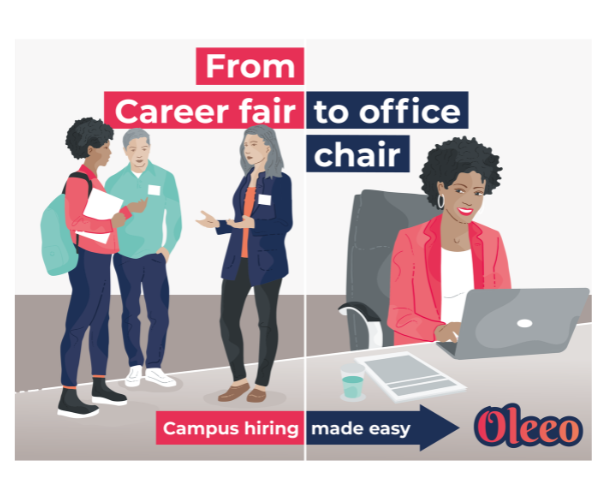Spotlight for Career Services Professionals
Spotlight for Recruiting Professionals
Not only can workplace discrimination and microaggressions have a negative impact on people of color in their careers, it can also affect their mental health.
For example, employees are often encouraged to bring their “whole selves” to the workplace.
“This can be difficult for people of color who have experienced microaggressions or incidents of discrimination,” explains Fatim Lelenta, assistant director of graduate career development at New York University.
“In the workplace, these incidents—whether they occur accidentally or purposely—can be quite damaging to one’s mental health, well-being, and careers.”
In terms of the impact on careers, Lelenta says that McKinsey’s Global Survey on Inclusion found that:
- 45% of ethnic or race minorities have chosen not to pursue a job because of a perceived lack of inclusion; and
- 59% more ethnic or racial minorities report having experienced a given microaggression than others in the workplace.
“[These findings] highlight how these additional challenges in the workplace for people of color can make career advance occur at a much slower pace than for their peers,” she says.
“The experience of microaggressions or discrimination can also impact one’s sense of belonging and feeling emotionally safe at work.”
Lelenta offers several examples of how frequent incidents of microaggressions can manifest:
- Self-doubt—This can look like a colleague having self-doubt and by asking themselves, “Am I overreacting or being too sensitive?” or saying, “Maybe, I don’t belong here.”
- Isolation—If a colleague is the only or one of the few people of color on their team, they may feel like there isn’t anyone to turn to when injustices occur. Having people who can empathize and affirm their experience is important.
- Impostor syndrome—Microaggressions can make it difficult for one to overcome feeling like an impostor or fraud. They may increasingly find it difficult to internalize their talents, skills, and accomplishments, which is necessary to succeed in their careers and advance professionally.
Wanda Quezada, Ed.D., mental health clinician with Faithlift & Hope, LLC, says that upon seeing her last name, administrators, supervisors, or people in charge of hiring process often make assumptions about her and her background without having met her.
“I get asked questions about cultures I don't know or that I am not familiar with,” she says.
“I have also experienced comments made directly about my hair or my attire in connection to stereotypes of my culture and how this would be frowned upon if I were in a higher position. It has been my experience that higher ups will praise me and my work, but always have a reason as to why I am not a ‘good fit’ for supervisory position. Usually, it has a lot to with personality traits they perceive and not qualifications.”
Faith Saunders, chief transformation officer and lead trainer at Discover a New Future, points out that intersectionality—for example, she is a woman of color—can further exacerbate the push for career advancement.
“The belief system of the leaders of corporations has a big part to play in the potential barriers that may exist within their companies,” she says.
“Many of them are white males who may not understand what a person of color may encounter in the workplace. Even if there are barriers, are they willing to change the culture?”
Changing the culture involves creating a safe place where employees can have real conversations about their unique experiences in life, during their career, and within the organization.
“We all want to feel valued and contribute,” Saunders says.
“These discussions can be a start to changing culture to allow people of color and others who may be marginalized to overcome barriers and advance within the organization.”
If people of color are not taught or do not learn how to deal with microaggressions, it could harm their careers, says Ansley W. LaMar, Ph.D.
“Accepting microaggressions can result in a lack of respect for self and reduce your perceived effectiveness in the eyes of others,” notes Dr. LaMar, psychology professor at New Jersey City University.
“Also, not dealing with the microaggressions and other forms of discrimination can result in the person of color becoming distant because of unexpressed anger and possibly displacing the anger on innocent others.”
Dr. Quezada explains that people of color often experience burnout because they have to constantly prove themselves even though they often have higher qualifications than their peers who are not of color.
“It is also difficult for people of color to seek support for the burnout if their supervisors are not aware of the discrimination and/or avoids admitting or dealing with it,” she says.
“The burnout can often lead to other issues like depression and anxiety for people of color because it is difficult to change their circumstances or they get the message that the discrimination that they are experiencing isn't real and that perhaps they should just deal with and get over it.”
Support in the workplace is a key to career advancement for people of color. Lelenta says that career development professionals understand the power of sponsorship and how beneficial it can be for one’s advancement and success.
“Having a sponsor is like having an advocate for you when it comes to promotions, growth opportunities, and pay increases,” she explains.
“For people of color, a lack of sponsorship can be a barrier to reaching their professional and career goals.”
Lelenta cites joint research by McKinsey & Company and LeanIn.org that found that Black women are much less likely than their colleagues to have a work sponsor and less likely than other women to feel that promotions are fair and objective.
“For people of color,” Lelenta says, “sponsorship is critical to helping amplify their voices and build relationships with individuals who hold a leadership role. A sponsor is a powerful workplace advocate and is necessary to close the achievement gap for people of color.”
Dr. Quezada agrees that a network of support is crucial for people of color, especially if they can find it within their fields.
“They should also look for possible ways of discussing with their supervisors their personal experiences and document these so that it reaches the right people within their organizations,” she adds.
“Self-care is also another way to deal with discrimination. Talking to a counselor, therapist, or support group is a great way to vent, de-stress, and find people who may have experienced similar issues and who can provide support.”
Schools and companies can help employees to address concerns of barriers due to color by continually evaluating the culture and ensuring employees feel included. They should also create space for authentic conversations.
“With our personal and professional identities being interwoven, it is critical that we continue to unpack this experience and help build inclusive workplace cultures,” Lelenta notes.
Addressing discrimination within an organization comes from the top. Lelenta, Dr. Quezada, and Dr. LaMar offer several suggestions for leadership to approach this issue:
- Take action—CEOs, supervisors, and managers should be responsible for creating a no-tolerance environment among their employees. Higher ups should also share and role model that discrimination is not tolerated in the workplace.
- Form a diversity team—Hiring or creating a diversity team in the workplace is a start. It should be comprised of more than one person and include people of different backgrounds to ensure equity and inclusion.
- Create affinity groups—Create affinity groups to safely discuss experiences at work and how to make it better.
- Offer diversity, equity, and inclusion (DEI) trainings—Providing DEI trainings will help develop tangible actions to educate staff and strengthen employees’ self-awareness.
- Recruit diverse talent—Intentionally try to hire people of color in your organization and create opportunities for mentorship and sponsorship programs. This will help employees of color to receive well-informed information about how to overcome the concrete wall and reach senior positions.
- Review the research—Read articles and empirical studies that highlight the experiences of people of color in the workplace. This can help lead deep discussions and inspire leaders to get to know their employees and establish themselves as a resource.
- Revamp processes—A specific promotion system should be implemented that is diverse and true to the population of its employees so that no employee should feel stuck because of discrimination.
- Address the issue directly—One reason people tolerate microaggressions and/or discrimination is because they do not know how to address it personally and legally. Offer assertiveness training and make employees aware of legal recourse.
“Leadership must be authentically committed to creating a community that embraces and sees the value of diversity,” Dr. LaMar says.
“Leadership must also develop numerous opportunities for people who are different to hear each other’s stories and must engage the entire community in developing a shared vision that includes racial harmony.”
Lelenta continues: “If you are someone who is not a member of an underrepresented group, think about how you can be an ally and take action in the moment. Speaking out against injustices reduces the burden for people of color to tackle systems of oppression on their own. Often times, this small act to speak up can make a huge difference for a person of color and can help them feel seen and heard.”
While supporting others, counselors and HR practitioners also need to consider the own mental health and well-being.
“There are so many trainings that counselors and HR practitioners can attend to be effective in supporting students and team members,” Dr. Quezada says.
“Counselors and HR practitioners can also be provided with mental health support to process their own feelings and become aware of their biases so that they don't get in the way when their trying to support students or employees.”
The relationship between personal and professional identities can no longer be separated, and they shouldn’t have to be, Lelenta says.
“Part of our work is to serve the next generation of professionals and help them find meaningful careers that align with their personal values,” she explains.
“As leaders in career development, we can no longer expect people of color to compartmentalize their personal and professional experiences. When we prioritize their lived experiences, we not only support their career development, but we help create a level of psychological safety for marginalized groups at work and in the world.”
Adds Dr. Quezada: “Social justice work is never-ending work. Often, I find that people feel that they can take one course, training, or workshop and that this then prepares them to be unbiased, anti-racist, or non-discriminatory people. But this is far from the truth. We have to continue to work at being anti-racist and keep talking about the issue until we can do better as a whole society. Understanding this is what will allow people to begin to do the work that is still much needed right now.”
The NACE People of Color Affinity Group will hold “Workplace Trauma: Overcoming Racial Barriers to Career Advancement” on Wednesday, January 27 from 2 to 5 p.m. Eastern. Registration is required and since space is limited, registration is only open to members of the Affinity Impact Team. Attendees are invited to briefly share their stories, guided in processing their experiences, and walk away with coping strategies. Breakout rooms will be facilitated by mental health career counseling experts. For more information, contact Flore Dorcely-Mohr or Debbie P. Smith.






